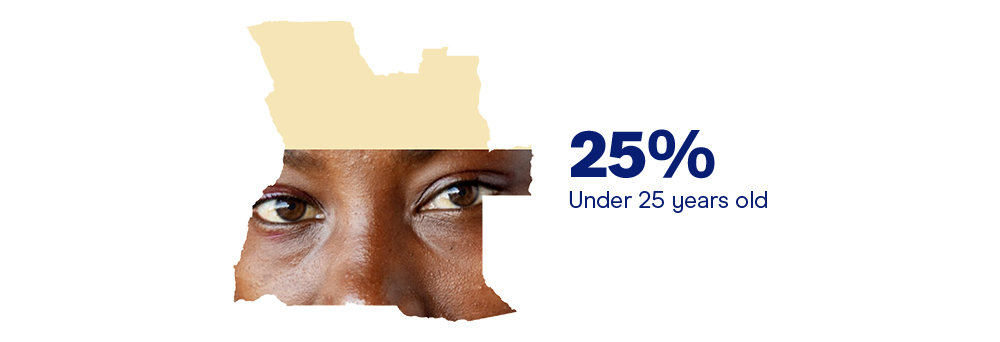In 2020, Angola experienced severe drought, which required urgent humanitarian assistance to over 562,000 members of the affected population. In times of humanitarian crisis, women and adolescent girls are often at risk of sexual violence, exploitation and abuse, including forced or early marriage. Victims of violence can suffer sexual and reproductive health consequences, including forced and unwanted pregnancies, unsafe abortions, and sexually transmitted infections, including HIV.
UNITED for Women and Girls in Angola
UNITED for Women and Girls in Angola
UNFPA Angola 2020 Annual Report
Message from the Representative
In 2020, Angola was struck by the COVID-19 pandemic, greatly impacting the lives of the local population, including their access to health care, food and access to services. Despite the barriers and obstacles aggravated by the pandemic, we have successfully mobilized resources to advance Sexual and Reproductive Health Rights in Angola, in close collaboration with the Government and civil society.
Read more about Dr. Mady Biaye3 KEY RESULTS IN 2020
COVID-19
In response to the COVID-19 pandemic needs and drought-affected women and girls, we achieved the following:
Sexual and Reproductive Health and Rights
KEY SRHR national data
The beginning of adolescence is a period of rapid changes in a girl’s life. Girls often enter this complex stage of their life unsupported, with very little information about what is happening to them and amid widespread stigma and myths about menstruation.
IMPACT STORY
-
Building capacity for young people via distance learning
In February 2020, in cooperation with Fiocruz and UNFPA Brazil, 150 technicians from Education, Health and Youth organizations participated in an international workshop to learn from Lesotho, Mozambique and Namibia experiences. The initiative aims to implement comprehensive sexual education in the school curriculum for young people to improve their knowledge about protecting their health, abstain from or delay the initiation of sexual relations, and reduce the number of partners and the frequency of unprotected activity sexuality. The goal is to enhance protection against unplanned pregnancy and STIs, prevent school dropouts, maternal deaths of young women and infant mortality.
Read more
Meet Lidia, a 16-year-old girl studying in Matala Municipality of Huila Province
Sadly, the average years of schooling per woman in this municipality is only three years, and many girls at Lidia’s age have already dropped out of school. For most, the dropout age is linked to the beginning of their menstrual cycle.
Many girls living in rural and remote communities like Lidia’s are unaware that menstrual hygiene products exist to help them manage their periods. The lack of knowledge contributes to the high rate of teenage pregnancy in the country. In Huila alone, 36% of girls aged 15 to 19 have already had their first pregnancy.
Lidia participated in the UNFPA pilot field activity of Training of Trainers (ToT) in Huila and shared her experience.
“We received the smart cycle and panties. We like using it. I feel comfortable and hope others who also have it feel the same way too.”
Seeing Lidia do this training alongside her male peers, creating a network of empathy between them without taboos, is essential in creating opportunities for equitable participation in society.

The following recommendations help to create successful interventions:
Young People
Angola has a youthful population, and the adolescent fertility rate is among the highest in the region. If current population growth in Angola continues at the same rate (3,2%), the total population may double by 2030 and triple by 2050.

Meet Isabel
Benvinda, for the closest, is a young 18-year-old girl who had her life course changed at the moment she connected to the girl’s empowerment program developed by UNFPA and ministered by Youth Support Centre at Cuca neighbourhood, Hoji-Ya-Henda district, Sambizanga municipality, where she lives.
Thanks to the program developed by UNFPA, Benvinda is not part of the statistics of teenage suicide cases. Although young, she bears a heavy burden, for she faced very early family problems. At age 12, she had suicidal thoughts. Benvinda knew about the UNFPA empowerment program for the first time in conversation with friends in the neighbourhood who already attended the lectures in the Cazenga municipality. Initially, she did not show any interest, but she had her first contact, and since then, she has never stopped.
Nowadays Isabel applies what she learned in the program. She developed her first business and firmly assures being close to make her dream come true: Singing! She uses her free time to compose her songs and mobilize other girls by showing them the positive results of being part of the UNFPA project implemented by CAJ (Youth Support Centre). The project now intends to reinforce the entrepreneurship component, especially with adolescent sex workers, offering them safer and healthier work opportunities.

Gender Equality and Women’s Empowerment
Women represent the majority of the Angolan population (52%). Gender statistics demonstrate the disparities between men and women, visible at the country’s different socio-economic levels and geographic locations (rural vs urban).

Population Dynamics
Angola’s population reached more than 33 million, with nearly two thirds below the age of 25 years, making it a very youthful population. The total fertility rate is 6.2 births per woman, and the population growth rate is 3.2 percent. At this growth rate, Angola’s population may double by 2030.
“The year 2020 was marked by the emergence and rapid proliferation of the COVID-19 pandemic. For all the effort and successes achieved in matters related to population and development, I reiterate my congratulations for the professional pride and dedication of the UNFPA and MEP Population Policy teams.”
Dr. Adriano Celso dos Santos Burity Vaz de Borja, National Director, Population Policy Office, Ministry of Economy and Planning, Angola
IMPACT STORY
-
Strategic partnerships to address developmental inequalities
UNFPA has two key implementing partners in the area of Population Dynamics, the National Institute of Statistics (INE) and the Ministry of Economy and Planning (MEP).
Read more
Partnering with the respective Ministries‘ Population and Demography Offices, UNFPA promotes awareness of population issues, advocates and supports the collection of disaggregated data and the development of key thematic studies, and supports capacity-building efforts through technical and financial means for staff.
Despite challenges faced due to the COVID-19 pandemic, UNFPA, with each partner, effectively implemented the 2020 Joint Annual Work Plans, taking into account rising needs linked to the pandemic and making adjustments as required.
Resources Mobilized
Download
OUR PARTNERS
In order to achieve our strategic results in Angola, UNFPA works with key partners from the respective sectors that house strategic knowledge and cover our geographical scope. UNFPA works in close collaboration with the Government of Angola, which provides the policy framework for its work and also implements many of the key programmes. Other implementing partners include both international and civil society organizations, including smaller non-governmental and community-based organizations, associations and networks:




